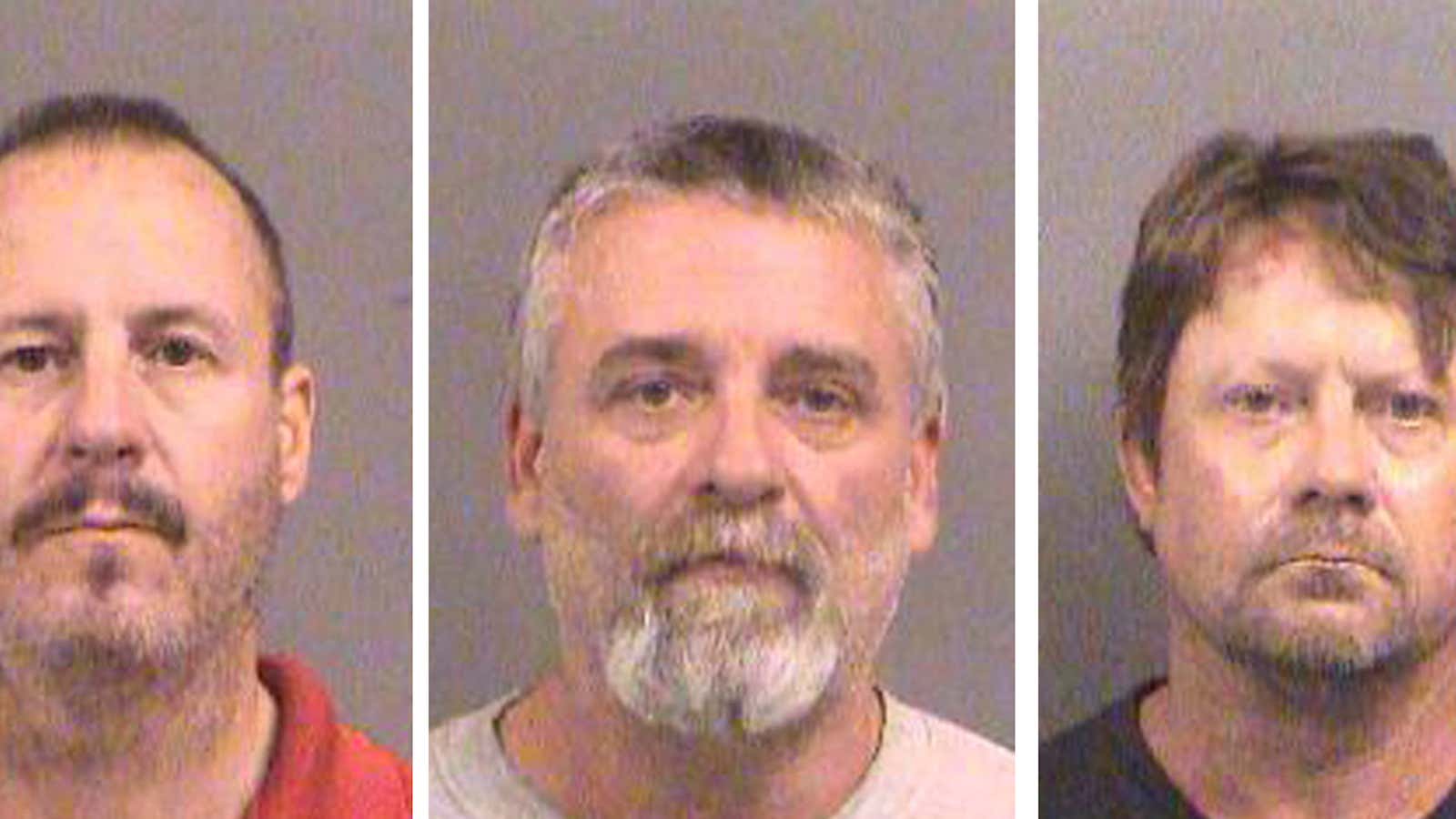As the presidential vote nears, concerns about Election Day violence—a phenomenon the US hasn’t experienced in decades—grow commensurately. With Donald Trump exhorting his followers to police ballot boxes, and with the Republican nominee’s claims of potential “rigging” drowning his policy recommendations, the likelihood of a peaceful Nov. 8 is fading alongside the democratic norms Trump has been undermining over the past few months.
But while much of these concerns remain hypothetical, we’re already getting a small taste of the threat the US may soon be facing.
On Oct. 14, the Department of Justice released a litany of accusations against a trio of Kansas militants allegedly involved in a plot to murder Somali immigrants. According to authorities, the three domestic terrorists were preparing to unleash a series of car bombs against Somalis living in the small town of Garden City, Kansas. The trio—Curtis Allen and Gavin Wright, both 49-year-old men and from Liberal, Kansas, and Patrick Stein, a 47-year-old man from Wright, Kansas—had considered targeting both churches and mosques before centering on an apartment complex that is home to more than 120 immigrants.
The group’s Islamophobia is clear from the DOJ’s complaint, which details how the trio’s plans were laced with crass epithets and racially tinged language. The militants wanted, Stein reportedly said, to “wake people up.” And the group’s planned carnage, according to the DOJ, was scheduled to occur the day after the election.
“Sadly, [the plot] didn’t surprise me at all,” says Mark Pitcavage, who focuses on right-wing extremism at the Anti-Defamation League. “They were planning truck bombs—they weren’t planning on some symbolic thing, like [targeting] a mosque when no one’s there, or anything. They were trying to blow up an apartment complex that easily would have had over a hundred men, women and children in it at the time.” Pitcavage notes that the group’s anti-Muslim rants mirror the sentiments of others in the far-right militia movement, a fringe patchwork of mostly white men who also believe the federal government can’t be trusted.
“They are gun nuts,” explains George Washington University’s JJ MacNab, an expert on anti-government extremism. “They are driven by guns, and they are driven by conspiracy theories about gun-grabs and all that. But when push comes to shove, they are going to [use] bombs.”
Digging through the social media accounts of the three, however, offers an anecdotal look into the alleged assailants’ motivations. First identified by MacNab, the three domestic terrorists maintained open Facebook profiles which they used to post pro-Donald Trump posts as well as the kind of anti-government, conspiracy theories that have been expressed at Trump’s rallies for months now.
Allen—who had been requesting that people compile a “list” of local Muslims to make a future “response much more timely”—noted in May 2016 that he’s a Trump supporter, while Stein posted a pro-Trump meme earlier this month, lumped among his pro-Confederacy comments, fake Founding Father quotes, and threats to kill UN peacekeepers. Wright, meanwhile, stuck to sharing Democrats-as-Hitler memes and posts putatively proving that US president Barack Obama was born in Kenya.
“You’ve got to keep this in perspective,” Pitcavage said. “The whole anti-government right, as well as the whole white supremacist right, like Trump, so it’s not going to be unusual to find pro-Trump stuff on any right-wing extremist’s profile.”
But the links to Trump’s campaign are about more than professed support online. Stein—the plot’s alleged ringleader whose Facebook remains littered with 9/11 and Sandy Hook Truther screeds—even aped the language of erstwhile Trump adviser Roger Stone, predicting that a “bloodbath” to follow the election. Likewise, per the DOJ, Stein wanted his team’s attack to convince Americans that “they want this country back,” quoting Trump verbatim.
The allegations have so far received discernibly little media play over the past week, drowned out perhaps by the GOP’s looming fracture and Trump’s post-debate threats to forego basic tenets of American democracy. But as Sarah Kendzior recently wrote in Quartz, the spectre of potential violence committed by Trump supporters shouldn’t be ignored any longer. As Kendzior noted, not only has Trump pushed violence at his rallies, he’s claimed that riots can help the US “go back to where we used to be when we were great.” Indeed, over the past two weeks, Trump supporters have called for a “revolution,” a “coup,” and voter intimidation for those “who can’t speak American.”
While Trump will certainly attempt to distance himself, however half-heartedly, from supporters who go so far as to plan bombings, the connection between his anti-Muslim, anti-government grandstanding and their actions is impossible to miss.
“[Trump’s campaign rhetoric] has played a huge role,” MacNab told me. Anti-government extremists “have always had to come up with excuses for why they’re going to do what they’re going to do. This campaign gives them respectability. The campaign says, ‘Oh, we’re not working in the shadows. We’re the heroes. We’re the patriots. We have a man who’s going to represent us in the office. And if he doesn’t win because he says the election is rigged, it’s going to be our duty to act on that.’”
